Relationship and strategic alliance between the United States and Saudi Arabia
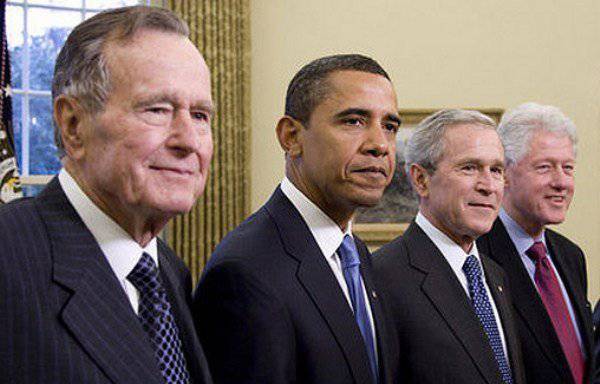
Edited by Terra America. History The US Middle East policy since 1970's is a consistent change in various geopolitical doctrines. The Nixon Doctrine emphasized the importance of the balance of power in the region between two US allies - Saudi Arabia and Shah's Iran. The Carter doctrine proposed to limit the prevention of the entry of external forces into the Persian Gulf region. Stanislav Khatuntsev, a regular contributor to Terra America, a historian and publicist, writes about the existence of another unofficial doctrine, the George Bush Sr. a possible bond with iraq Saddam Hussein. Has the Bush doctrine led to a crisis in the US Middle East policy, and can it be revised by the Obama administration, by its representatives who are preparing a political agreement with Tehran? This is the theme of this and a number of subsequent publications on our site.
The relationship and strategic alliance between the United States and Saudi Arabia is one of the most important foundations of the current world order - the world order, the strength of which in recent years raises ever more reasonable doubts. The current administration’s desire to find some kind of strategic counterbalances to the Arab monarchies, which are actually expanding under the guise of fighting dictatorial regimes in the region, is too clearly felt.
Alliance history
The US-Saudi alliance began to take shape in the 30 of the last century, when the Standard Oil Company of California, one of the leading firms in the oil kingdom of Rockefellers, received a concession in Saudi Arabia. This happened in 1933, when Franklin Roosevelt was elected President of the United States, and Adolf Hitler became German Chancellor. The theocratic neoplasm [1] needed sources of income and wanted to distance itself from the British Empire, in close cooperation with which it was formed.
In March, huge oil fields were discovered in Saudi Arabia and Kuwait, and in 1938, the most famous scientist and geologist entrepreneur, Everett Lee De Golier, personified the American oil industry and its rapid development in the first half of the last century, speaking in Texas predicted that the Middle East "will become the most important oil region in the world in the coming 1940 years."
February 18 1943 - 1,5 after the year after its reassuring statement for London that Saudi Arabia is "far away" from America, F.D. Roosevelt included King Abdulaziz Ibn Saud in the Lend-Lease program. The following year, a significant shortage of oil caused anxiety of the military in Washington, which gave a strong additional impetus to rapprochement with the owners of the Arabian deserts.
After the Yalta Conference, the US President had a 5-hour meeting with Ibn Saud, who sought to ensure the continued presence of the overseas power in his homeland at the end of the war; for the Wahhabi leader, it had to neutralize and balance the influence of "foggy Albion". The parties signed an agreement on the monopoly of the United States on the development of Saudi deposits - the Quincy Pact. According to this pact, the United States received exclusive rights to explore, develop fields and acquire Saudi oil, guaranteeing the Saudis protection from any external threat.
From the point of view of the US Secretary of the Navy of those years and the first US Secretary of Defense (1947 - 1949) James Forrestal, "al-Saudi", as the country is called by the Arabs themselves, was of "paramount importance". On this topic, freshly baked Secretary of State James Byrnes listened to a whole lecture from him in Potsdam.
Theory of conservation
After the Second World War, a concept emerged in the United States, known as the "theory of conservation." It was that the US government needed to take control and develop foreign oil resources and reduce the production of its own raw materials, mothballing domestic reserves for the future. This guaranteed the national security of America.
These resources were located primarily in the Gulf region. Thus, the States became the successors of the oil policy, which since the end of the First World War, their imperial predecessor, Britain, has adhered to.
"The theory of conservation" immediately began to be implemented in the plane of practical politics. If, before 1947, US oil exports prevailed over imports, then in 1948, imports of crude oil and petroleum products exceeded exports for the first time. The development of oil fields in Saudi was in the hands of Aramco - the Arab-American Oil Company; so in 1944, the name became KASOK, the California-Arab Standard Oil Company, which was owned by the Rockefeller Standard of California and Texaco.
The policy of "crystallization"
The direct involvement of the Washington cabinet in Saudi Arabia’s affairs is known as the policy of "crystallization". Saudi was among the most important areas of foreign interests of America. The states have established a unique relationship with Saudi Arabia. One of the US officials in 1948 said that the wealth of this country "was probably the most valuable economic acquisition in the world in the field of foreign investment", and in October 1950, President Harry Truman confirmed in a letter to Ibn Saud those promises - assurances that the US is interested in preserving the independence and territorial integrity of Saudi. Any threat to this kingdom should be promptly perceived as requiring attention and care from the States [2].
But “good old England” still maintained its military-political positions in the Gulf region, and until the beginning of the 70s, security in the region was maintained by a British-American tandem — a teaming up in the old and new leaders of the Western community. However, in November 1971, the British said “enough”, packed and left the oil-rich shores. Their withdrawal meant the deepest since the Second World Change in this region, which supplied 32% of oil to the non-socialist world and concentrated 58% of proven oil reserves. The security system that existed there almost from the middle of the XIX century collapsed completely.
Doctrine of nixon
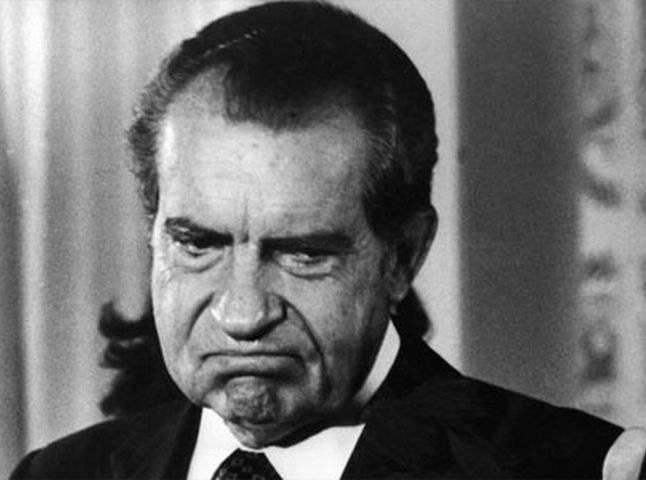
The vacuum of power in the region filled Shah Iran - a close partner of America. So in the Middle East, the era of the Nixon Doctrine, which consisted in relying on strong and friendly local regimes of the United States as regional police officers, began. In the Persian Gulf, in contrast to South Vietnam, this doctrine worked. The Saudis had to “swallow” the US-supported strengthening of Iran, their main rival in the region, since the fundamental elevation of the Pahlavi dynasty was not threatened.
The danger for the balance of power in the region and for the US-Saudi alliance was not Baghdad, but Tehran. Iraq had its own long-cherished ambitions to establish dominance over the region rich in oil. Back in 1961, when Kuwait became completely independent of the British Empire, Baghdad put forward claims to the territory of this country and threatened to invade it, abandoning its intentions only after England allocated a military contingent to protect its former subjects. In protest, Iraq suspended its membership in OPEC, but this did not help it at all.
After the Baathist coup in the country, a regime aimed at building "Arab socialism" was established, and Baghdad began to purchase large quantities of Soviet weapons. However, Iraq has a purely technical approach to the Persian Gulf, and the chances of changing the balance of forces in the region, even taking into account geopolitical support from the USSR, were also very modest in confrontation with the new, US-Iranian tandem.
Carter's doctrine
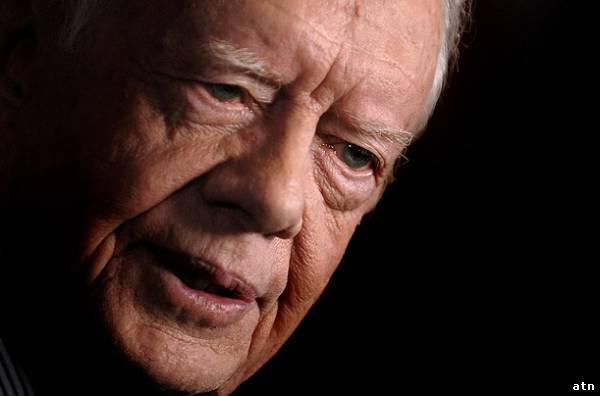
Meanwhile, an Islamic revolution occurred in Iran, and the "Nixon Doctrine" gave way to the "Carter Doctrine". In January 1980, the American president spoke directly and frankly: "Any attempt by external forces to gain control over the Persian Gulf region will be viewed as an encroachment on the vital interests of the States, and such an attempt will be reflected by all necessary means, including the military."
The Carter Doctrine was in many ways similar to the declaration of British Foreign Minister G. Lansdun, who in 1903 year demanded that Kaiser Germany and the future ally in the World War Russia stay away from the shores of the same “wet place”.
In this situation, the chances of Baghdad to expand "a place in the sun" have increased significantly. The harsh confrontation of the new regime in Tehran with America made the latter not only turn a blind eye to the plans of the Iraqi dictator Saddam Hussein to snatch everything that is possible from Iran, plunged into the confusion and chaos, but also to provide him with very significant help. The Arab countries of the Gulf also seriously helped Iraq, fearing “exports of the Islamic revolution” - not to mention the USSR and the countries of the Soviet bloc as a whole.
The Iran-Iraq war ultimately led to the implementation of the Carter Doctrine: in July, 1987, US Navy, launched Operation Earnest Will to escort tankers, which were fired on by both sides during the conflict. Thus, the US military-political presence in the Persian Gulf became a tangible reality, and that was the beginning of the course, the implementation of which is fully connected with the name of George Herbert Walker Bush.
What do we know about the elder Bush?
This president, who came out of the oil and gas industry, is one of the best experts in the modern world. It's no secret that the Bush family belongs to the aristocracy of the Northeast coast; his ancestors arrived on the American land almost aboard the Mayflower. True, there are allegations that the ancestors of the president on both the paternal and maternal lines appeared in the States only in the second half of the 19th century.
It is authentically known that Bush Sr., a WWII veteran known as the youngest marine pilot aviation USA, graduated from Yale University, where he was initiated into the secret society of Scull and Bones. It is generally accepted that only representatives of the highest overseas elite, immigrants from the most influential and wealthy families of the United States, become members of this lodge. So, in addition to several generations of Bushes, this lodge included representatives of the Rockefeller family, known for its close ties to the oil business. Leaving university walls and holding important posts, Scull and Bones members tend to keep in touch with each other for the rest of their lives.
Bush Sr. began his work in the oil business as an intern, then “grew up” to a traveling salesman, then he formed an independent oil company - Zapata. Senior Bush became a professional politician only in 1966, leaving the post of chairman of the board of hydrocarbon corporations. As a congressman from the state of Texas (Houston), Bush vigorously defended the interests of the Texas petroleum industry.
Back in 1964, when the future 41 President of the United States ran for the Senate from Texas, his opponent, Democrat Ralph Yarborough, called George Bush a hiring Kuwaiti sheikhs: it was believed that Bush had shares in various Kuwaiti oil drilling companies. As director of the CIA (1976 – 1977), Bush did some business with BCCI (Bank of Credit and Commerce International), headquartered in Abu Dhabi, the UAE capital. The American special services this bank aroused suspicion of involvement in the financing of armed groups of Islamic extremists. It later emerged that BCCI directly sponsored the creator of al-Qaida, Osama bin Laden.
Interestingly, the Panamanian dictator, General Manuel Noriega, whom the elder Bush as the director of the CIA financed, received money (110 thousand dollars monthly) along the chain, one of the links of which was the same bank in the UAE [3]. Kevin Phillips, author of the book American Dynasty, claims that as the head of the CIA, Bush attached particular importance to the activities of this organization in Iran, Afghanistan, Pakistan and the Gulf countries, doing everything possible so that America would legitimately supply these countries weapons.
Arab Sheikhs Partner
In the 1986 year, as vice president, George Herbert Walker Bush made a visit to the Middle East. In the Reagan administration, he was the most prepared person for this mission. While in Riyadh, Bush negotiated on oil issues with Saudi ministers, including the famous Ahmed Zaki Yamani, one of the creators of OPEC and the 1973 Arab oil embargo. He now heads the Center for Global Energy Studies in London, founded by him in 1990.
Then the vice-president of the United States met with King Fadh. The main subject of the conversation was the military successes and threats of Iran, which caused the Saudis great concern, the issue of security in the Gulf and the supply of American weapons to Riyadh.
This visit intensified the Bush clan’s relations with politicians and businessmen of the Persian Gulf zone, primarily from Saudi Arabia. Later, moving away from big politics, Bush Sr. returned to business and ended up in The Carlyle Group (Carlyle Corporation) - a community of associates, including the family of Saudi magnates Bin Laden, who formally broke up after the September 11 attack. Bush at Carlyle Corporation was in charge of the Asian sector. Until October 2003, he was a senior adviser to the company, then became one of the major shareholders and was repeatedly spotted at sumptuous receptions, business lunches, dinners and entertainment events involving businessmen from Saudi.
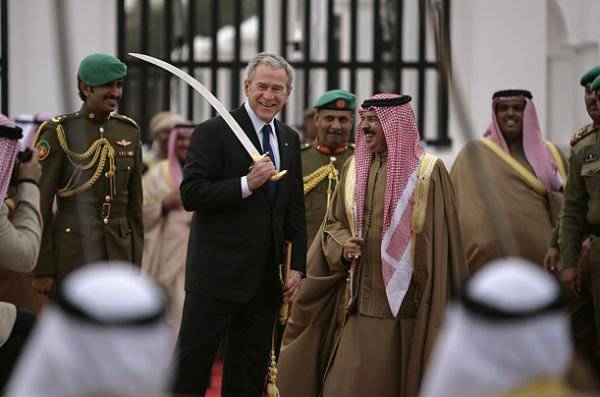
The Carlyle Group is the official economic advisor to the Saudi government and the clan bin Laden. At the same time, it was not the holy family Carlyle who was involved in the investigation into the circumstances surrounding the preparation of the 9-11 attacks. On this basis, Larry Kleiman, president of the law firm of Judicial Watch, publicly advised Bush Sr. to "immediately withdraw from the Carlyle Group."
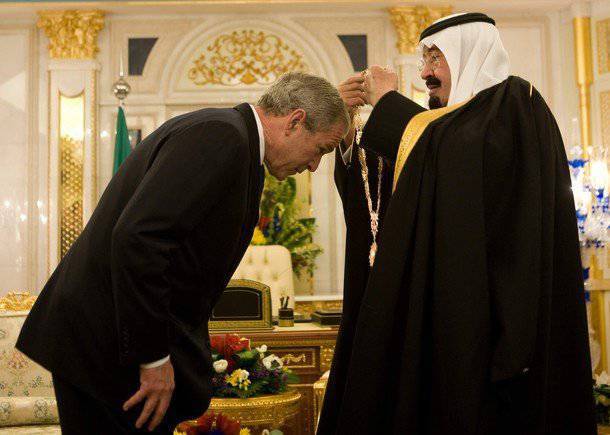
Bush’s eldest son, George Walker, is known for his close ties with Crown Prince and current Saudi King Abdullah, as well as with the country's ambassador Bandar bin Sultan. 43 is the American president who gave him the nickname “Bandar Bush” [4].
According to a number of researchers from the United States, although the Arabian monarchies in the field of security are largely dependent on American support and arms supplies, we can talk about the subordination of certain areas of US foreign policy - mainly in the areas of energy, security, arms exports - developing relations with the countries of the region the interests of the Gulf states, first of all, Saudi. On accounts in American banks is about a trillion dollars of Saudi origin. Approximately the same amount of Arab funds rotates on the US securities market. If it is decided to withdraw this money from a weakened US economy, this measure will have a catastrophic effect on it [5].
Iraq starts and loses
But back to the end of 80's. Iraq, which had not achieved its geopolitical goals in the war with Iran, turned out to be a large debtor of the rich Arab world, including its closest neighbor - Kuwait. And although the latter was a product of the imperial policy of London, which, by creating and supporting this coastal principality, cut off the Ottoman Empire from the Persian Gulf, weakening the potential threat from Constantinople to its possessions in India, the “rights” imposed on Kuwait by Iraq looked more than doubtful.
The occupation of this country could solve many problems of the dictatorial regime in Baghdad - if the United States had closed its eyes to its disappearance from the map of the world. In this situation, Iraq received a very decent “door” to enter the Persian Gulf, liquidated a lender who owed many billions of dollars, and established control over 20% of oil production by OPEC and 25% of world oil reserves.
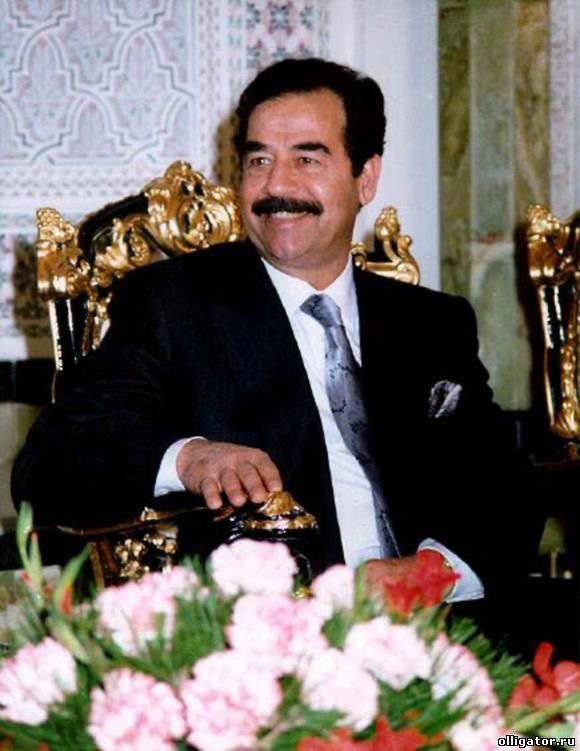
But even without the Kuwaiti “anabasis,” Baghdad, which had intensified under Hussein, simply hanging its military potential over oil Riyadh, strongly upset the balance of power in the region and was a powerful threat to the US Xioma’s Middle Eastern Saudi policy. From the foregoing, it can be seen that the possible leadership of Iraq in the Gulf sharply contradicted the fundamental foundations of American policy that had been forming since the 6s of the last century.
However, to “besiege” the dictator without a serious reason in the conditions of the end of the Cold War was fraught with the risk of making accusations of hegemonism and dragging over blankets of geopolitical interests. In addition, there was, albeit a purely hypothetical, thanks to MS Gorbachev, but still not a zero possibility of a negative reaction from the USSR to the "oppression" of Saddam Hussein by the States. Therefore, the seizure of Kuwait by Iraq did not contradict their tactical interests, understood with regard to further political measures. Apparently, there was a subtle provocation: during a conversation with the American ambassador in Baghdad, the dictator, who sounded the US attitude towards the possible seizure of Kuwait, received an ambiguous answer from the latter and played all-in.
However, even after that, Iraq could go to the “peace”, clearing the occupied country, but such a move threatened the Baathist regime with serious internal difficulties, primarily with the discontent of the army that ruled in Kuwait.
Unipole End
The "Storm in the Desert", conducted by Bush Sr., not only eliminated the "Iraqi threat", but also established the sole US hegemony in the Gulf, and also initiated the trend of "unipolarity" in American foreign policy. However, in recent years, the situation in this area is definitely changing. The time of the “unipol” seems to be over, which demonstrates the withdrawal of American troops from Iraq and the reduction of the US contingent in Afghanistan.
Otherwise, we would have long witnessed the hostilities between Washington and Tehran, whose military-political power has increased significantly in recent 10 years, and its regional positions have noticeably strengthened.
Does the tail twirl the dog?
At the same time, Saudi, together with the smaller Arabian monarchies, can hardly be considered a reliable pillar of the States. As a result of the policy initiated by Bush-father, but the most articulated by Bush-son, the United States themselves were dependent on partners in the Gulf zone.
It should be noted that these partners, despite the mountains of the newest weapons, are militarily weak and doubtful. At the same time, America, which in recent years has been successfully developing hydrocarbon production on its own territory, in the foreseeable future can almost completely abandon their imports, today, in order to support its "allies", it has to buy energy supplies worth tens of billions of dollars from them annually.
In addition, the regimes of the Arabian opponents of Hussein, Gaddafi and Assad are not only not democratic, but very often surpass the dictators of the Islamic world in the scale of the violation of civil rights and freedoms; therefore, the "Arab Spring" hung over the kings and emirs with the sword of Nemesis.
In an effort to diversify the states of the Middle East, the neocons tried to make democratized Baghdad a counterweight to the floodplains and the "reference platform" of Washington. But this idea turned out to be untenable. Today in Iraq, more and more competing with each other are those who focus not so much on America, but on regional centers of power.
Relying on "awakened" Egypt, the United States in the coming years, too, can not.
These facts cause dissatisfaction with many American politicians, and above all - the so-called "realists."
Therefore, more and more closely, the White House is eyeing Iran. We cannot exclude the emergence of a new foreign policy doctrine - the “Obama doctrine”, designed to end the legacy of the “Bush doctrine” and providing for other than now relations with Tehran. The question is - will this doctrine work?
-------------------------------------------------- ------------------------------
[1] In September 1932, the territories of Nejd and Hejaz were merged into one state called Saudi Arabia.
[2] Yergin D. Extraction. World history of the struggle for oil, money and power. M .: Alpina Publisher, 2011.
[3] It’s not out of place here to recall that Samuel Prescott Bush, the father of the elder Bush and the future senator, was convincingly accused of financing the Nazi regime in Germany, and before 1917, Sam Baky headed the Ohio railway company Bacai Steel Castings, belonging to the Rockefeller family.
[4] "He is reportedly close to Bush, who calls him" Bandar Bush "."
[5] D.M. Levner Saudi lobby in the United States. Http://www.iimes.ru/eng/stat/2011/22-11-11c.htm#_edn1#_edn1
[6] "Sacred Cow".
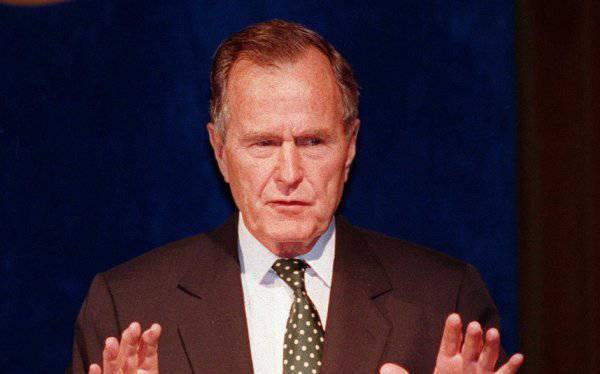
Information